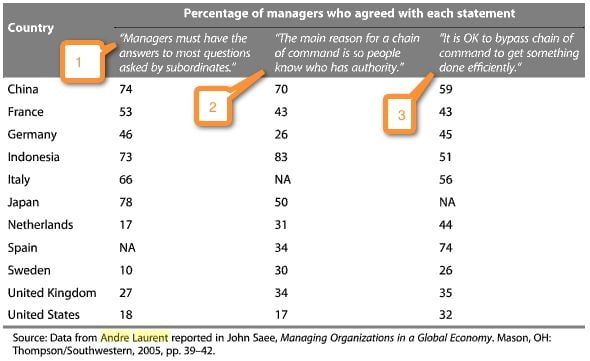What is International Management?
Checking the online encyclopedia Wikipedia does not give an answer (the page does not exist!). Still, in Cultural Awareness Training, it is a real important issue. How do you manage internationally and/or how do you manage the expectations of other people when working Internationally?
Management
From an Organizational Psychological standpoint, one could argue that to get the most out of the people you manage, you manage them according to the way they want to be managed. This may sound like common sense but is certainly not common practice. Typically not when working with different cultures.
Most managers manage “using” their personal style, personality and not to forget their own culture. In a mono-cultural setting, culture does not play a role, since all people (including management) belong to the same culture. However, in a multi-cultural setting culture plays a crucial role. The way people are managed influences several aspects:
- The overall outcome of work performed by individuals & teams
- Perception of credibility of the Manager
- Perception of credibility, from a management standpoint, of the people working
Typically when the (work) pressure goes up, people have a tendency to revert back to their own “default” cultural behavior.
Research
Mr. André Laurent (INSEAD) has done some really interesting research on this subject. Have a look at the table below.
The statement (call-out 1) reads:
“Managers must have the answers to most questions asked by subordinates“, followed by a number of countries, with percentages of managers in agreement with the statement.
Let’s compare China with Sweden. China has 74% of the managers in agreement; Sweden has 10% in agreement.
What does it mean?
In Sweden, if a manager does not know the answer to a question, (s)he can “easily” say “I don’t know”, and the person asking the question will not mind.
In China, the expectation of subordinates is much different than in Sweden. Subordinates being sent away with an “I don’t know” answer will quickly lose trust in their manager. Their manager is just not credible because as a manager you should “know“.
The Second call-out reads:
“The main reason for a chain of command is so people know who has authority.” Again, looking at China & Sweden, you can see the same trend. China scores relatively high on Hofstede’s dimension Power Distance, while Sweden scores on the low end. Which is a good explanation for the differences between these two countries. In higher-scoring countries (e.g. China) you want to see who is in control: the Boss. While in Sweden (low score on Power Distance), who is in control is much less important.
The Third call-out reads:
“It’s OK to bypass the chain of command to get something done efficiently.” Here you can see the opposite. In China, people feel it is OK to bypass the chain of command. The reason for this is, from a subordinate’s point of view, the boss is not always right. And to get things done, you need to do them either yourself or get them done through a back door.
While in Sweden, subordinates are not as likely to break the chain of command. Typically they don’t have to because they have delegated authority anyways. And if they don’t, well… you just do what your boss tells you to do (at his or her risk, not yours).
Learning points
What is crucial to understand here (going back to something said already) is that people want to be managed the way they want (or rather expect) to be managed. If you’re a Swede, working in China, you better know all the answers that you’re asked. If you’re Chinese, managing in Sweden, you don’t need to know everything. Plus as a Chinese manager, it makes sense to give your subordinates a greater (greater than in China) range of freedom and delegated authority.
Here’s some more reading material:
- Want to read more? Read this article about Cross-cultural management
What is your experience when managing other Cultures?
An infographic on organizational culture can be found here.
Want to know what a diversity manager can do for you, read this article.
An article about doing business in Scandinavia can be found here.
Interested to read more on diversity training? Read this article.
Get a Taste of How Chris Presents, Watch his TEDx Talk
 Call Direct: +32476524957
Call Direct: +32476524957
 European Office (Paris) Whatsapp: +32476524957
European Office (Paris) Whatsapp: +32476524957
The Americas (USA; Atlanta, GA; también en Español): +1 678 301 8369
Book Chris Smit as a Speaker
If you're looking for an Engaging, Exciting, and Interactive speaker on the subject of Intercultural Management & Awareness you came to the right place.
Chris has spoken at hundreds of events and to thousands of people on the subject of Cultural Diversity & Cultural Competence.
This is What Others Say About Chris:
- “Very Interactive and Engaging”
- “In little time he knew how to get the audience inspired and connected to his story”
- “His ability to make large groups of participants quickly and adequately aware of the huge impact of cultural differences is excellent”
- “Chris is a dedicated and inspirational professional”
In addition, his presentations can cover specific topics cultural topics, or generally on Cultural differences.
Presentations can vary anywhere from 20 minutes to 2 hours and are given worldwide.
Book Chris now by simply sending an email. Click here to do so.
Read more about what Chris can do for you.
- Percentage of People Rating a Presentation as Excellent 86%
- Rating the Presentation as Practical 89%
- Applicability of Chris' presentation 90%
About Peter van der Lende

Peter has joined forces with Culture Matters.
Because he has years and years of international business development experience joining forces therefore only seemed logical.
Being born and raised in the Netherlands, he has lived in more than 9 countries of which most were in Latin America.
He currently lives in Atlanta, Georgia (USA) with his family.
You can find out more at https://expand360.com/
Or find out what Peter can do for you here.
- 200 Performance Reviews and Appraisal System - 20 January 2026
- 199 AI, Leadership, and Cultural Differences with Crispin Thompson - 13 January 2026
- 198 Cultural Differences and Government with Maria Paula Correa - 18 November 2025



 Call Direct: +32476524957
Call Direct: +32476524957 European Office (Paris) Whatsapp: +32476524957
European Office (Paris) Whatsapp: +32476524957
Hi Chris,
thank for this illuminating article. But I would find it hard to explain in a training session to westerners, why in China they would feel it alright to bypass the chain of command to get something done (given the power distance between boss and subordinate) unless this was done with the implicit knowledge/consent of boss who needs to maintain his authority/reputation so can’t ‘get his own hands dirty’.
I remember a case study I did once where an expat marketing officer in China discovered a production defect affecting an imminent shipment, tried to inform her boss to inform the production mgr (both on same level) to try to rectify the defect before shipping off, her boss was on leave so she took it upon herself to contact the production mgr directly but was rebuked for having crossed lines of command ……… the production mgr expected to be informed by someone at his own level in the hierarcy etc.
rgds,
ck
Hi Christina,
Thanks for your comment. And I must say I agree with you that this is an awkward finding from this study.
I also agree that under “normal” circumstances Chinese workers will not bypass their boss. The only rational explanation I can give for this is that the statement talks about doing something “efficient”. It could be that if the boss is incompetent and engaged with his own career, he does not pay enough attention to his workers.
This could lead to demotivation of the subordinate, leading to him or her taking own initiative (to possibly climb the hierarchical ladder).
Remember that in high scoring Power Distance countries the Boss is Accepted, but not always Respected.
In your case study, could it be that Collectivism plays a role as well; Workers belong to one group, while Management belongs to another (In-group versus Out-group)?
Curious to hear your thoughts.
Hi Chris,
I’m having trouble understanding column 3 as well. Could it be that the score is based on the % who “disagree” NOT “agree” with the statement. I’ve read some other interpretation of this result and they read the % as disagreement. This would make more sense. As i don’t believe hierarchical organisations & cultures will by pass their boss.
Would be interested to get your thoughts on that.
Best Regards, Neil
Hi Neil,
Yes, the third column is confusing to understand. And also for me it does not make 100% sense.
The danger lies in interpreting too much (left right and center) just to make the numbers make sense. That would not be right either.
The numbers in the 3rd column seem to inversely correlate with Power Distance.
If I have some time I’ll see if I can find the original research from André Laurent